Health and Social Care
My first year as Women’s Health Champion
January 23, 2024 by Professor Anna Glasier No Comments | Category Women's Health Champion
“I have thoroughly enjoyed the last year working as the Women’s Health Champion and am truly honoured to be given the opportunity.”
It is now almost a year since I took up the post of Women’s Health Champion.
During 2023 I have met with scores of people working in government, in the NHS and in the Third Sector, as well as women themselves, who have kindly shared their experiences and health journeys with me. Their enthusiasm for the Women’s Health Plan has been palpable, and these meetings have helped me to understand how things are currently being done and what the potential barriers are to delivering high-quality services. I have heard many examples of good practice, and, importantly, have connected people who work in similar areas but who don’t know one another.
The Women’s Health Plan includes 66 short, medium and long-term actions. Although being involved with all the actions, when first appointed I chose three areas for my particular focus – menstrual health, menopause, and cardiovascular health.
Within menstrual health I am taking a particular interest in polycystic ovarian syndrome (PCOS) which is less well known than endometriosis, but which affects women from puberty to the post-menopausal years and is associated with an increased risk of cardiovascular disease and diabetes.
I chose the menopause since all women undergo menopause and yet there is widespread misunderstanding about its nature and the options for treatment if women have troublesome symptoms.
Cardiovascular disease (CVD) is among the most common causes of death among women in the UK. Of the four UK nations, Scotland has the highest incidence of both CVD and its associated risk factors. Importantly too, the social determinants of health have a big role to play in disparities in the prevalence of CVD.
Having spent much of my NHS career and my academic research working on contraception and abortion I have also continued to take a particular interest in the work of the sexual health and abortion policy teams.
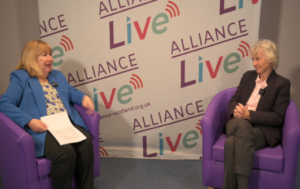 Working with the Health and Social Care Alliance Scotland (ALLIANCE) provides opportunities to engage with women directly through the Lived Experience Stakeholder Group and raising awareness through speaking at webinars including PCOS and a panel discussion for World Menopause Day on 18th October on all things related to menopause. I recently had an enjoyable visit to the ALLIANCE in Glasgow for an interview with Irene Oldfather to talk about my role as the Women’s Health Champion.
Working with the Health and Social Care Alliance Scotland (ALLIANCE) provides opportunities to engage with women directly through the Lived Experience Stakeholder Group and raising awareness through speaking at webinars including PCOS and a panel discussion for World Menopause Day on 18th October on all things related to menopause. I recently had an enjoyable visit to the ALLIANCE in Glasgow for an interview with Irene Oldfather to talk about my role as the Women’s Health Champion.
I publish this quarterly blog to keep people informed of what I have been doing as Women’s Health Champion and the wider work that is being achieved.
Working with Health Boards
All Boards are now represented on the Women’s Health Leads Network. I chair a quarterly meeting with the Network where we update members on progress with the Plan. It is a forum for sharing examples of good practice, discussing things that are not going well and agreeing how best to take forward certain elements of the Plan. We have visited NHS Greater Glasgow and Clyde, NHS Lothian and NHS Grampian and held interesting and fruitful discussions on the role of the Boards in improving Women’s Health. In 2024 I hope to visit more Boards.
Menopause
Widespread publicity in the media about the menopause has resulted in a marked increase in women attending their general practice for menopause advice and a subsequent increase in referrals to specialist menopause services. In line with one of the actions of the Women’s Health Plan, all health boards in Scotland now have access to a menopause specialist (the Island Boards through a buddy system). A thriving Scottish Menopause Specialist Network meets quarterly to discuss challenges and facilitators to menopause care.
I feel that much routine menopause management can, and should, be done in General Practice and I strongly believe that there should be a GP in every practice with an interest in women’s health including the menopause. To this end we have been working with NHS Education for Scotland (NES) to develop a free and flexible training programme for healthcare professionals working in general practice in both menstrual health and menopause.
Menstrual Health
Stimulated by the success of the Menopause Specialist Network we have recently set up a Menstrual Health Clinical Network with the aim of improving the management of women with menstrual problems such as heavy menstrual bleeding, endometriosis, polycystic ovarian syndrome etc. It is already a useful forum for discussing difficult cases and providing clinical updates including a recent spotlight on pre-menstrual syndrome (PMS).
Health Inequalities
The purpose of the Women’s Health Plan is to reduce health inequalities and improve health outcomes for women in Scotland. I am working with the Scottish Deep End Project on a pilot study involving taking a specialist Women’s Health Service to a small number of Deep End Practices. The service would offer all aspects of women’s reproductive health care but also use the opportunity to deliver care in a holistic way assessing, for example, risk factors for cardiovascular disease and with a view to improving future health. The aim would be to ensure that practitioners already caring for women benefit from working alongside a women’s health specialist so that they can improve their confidence and the quality of their service.
Cardiovascular disease
I have been working to ensure that the actions within the Women’s Health Plan on cardiovascular disease are progressed. I have set up a small group to help provide tools to ensure that women with cardiovascular disease are given accurate and high-quality advice about prenatal health, contraception and management of the menopause.
Throughout the reproductive life course women have contact with specialist healthcare providers with conditions which are associated with an increased risk of CVD in later life. Premature menopause, PCOS, pregnancy-induced hypertension (PIH) and recurrent miscarriage are all associated with increased CVD risk and yet this lifetime risk is often not communicated to women when they are seen by obstetricians and gynaecologists, who may be focused on managing the immediate concerns and symptoms.
I am now discussing reinstating routine self-monitoring of blood pressure (BP) among women with PIH throughout Scotland. During the Covid-19 pandemic, throughout Scotland women attending maternity services and diagnosed with PIH were given a blood pressure monitor and urine testing strips to self-monitor their condition. After delivery they were asked to return the BP monitor. When service delivery moved into post-pandemic recovery, most health boards stopped the self-monitoring initiative. I am keen to trial encouraging women to keep the BP monitors and participate in regular telemonitoring through the Connect-me BP programme, as while some women with PIH may have their BP checked at the routine post-natal visit they may not be fully made aware of their increased risk of hypertension.
Contraception
Long-acting reversible contraception (LARC): Abortion rates have risen significantly in Scotland in the last year. While many factors influence abortion rates, including access to abortion services; the cost-of-living crisis; changing attitudes towards the acceptability of abortion and to different methods of contraception, it seems likely that access to contraception is playing a role. Contraception is one of the cheapest public health interventions available.
The most commonly used methods of contraception in the UK are oral contraceptives and male condoms which have annual failure rates during typical use of 9% and 18% respectively. The most effective contraceptive methods are the so-called longer-acting reversible methods of contraception (LARC – intrauterine devices and contraceptive implants) with annual failure rates of <1% and much higher continuation rates than pills or condoms. Yet general practices and sexual and reproductive health (SRH) services in Scotland are not meeting the demand for LARC.
With assistance from a short-life working group we have explored the reasons for this and discussed alternative models of LARC provision.
Improving provision of post-partum contraception (PPC): Working with the National PPC Network we are hoping to ensure that all women in Scotland attending antenatal clinics have a routine discussion by 34 weeks gestation on PPC and that their method of choice is recorded in their maternity record.
At a very recent meeting of the Network, we learned that considerable progress is being made with this initiative.
Contraceptive choices for younger women: We are aware of changes in attitude across the UK and Europe whereby younger women (<30 years) are moving away from hormonal contraception. We hope to look into this further with stakeholders from across the UK, and young women themselves, to understand what support we could put in place to provide young women with the information that they need to make decisions about their reproductive health, through access to accurate and comprehensive information resources, in the places where they are.
Reflections on my overall experience
I have thoroughly enjoyed the last year working as the Women’s Health Champion and am truly honoured to be given the opportunity.
Almost without exception everyone I have met has been enthusiastic and unfailingly helpful. I am particularly grateful to Professor Marion Bain and to the civil servants in the Women’s Health Team who have helped me to understand how things work in Government and kept me on the right track.
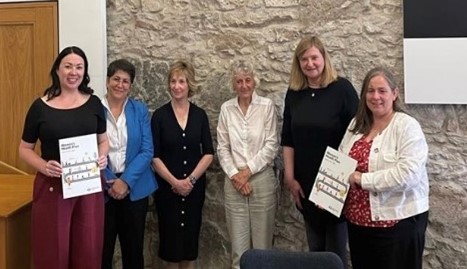
Meeting between the Minister for Public Health and Women’s Health, the Women’s Health Champion and Women’s Health Spokespeople from opposition parties
I think the Plan has made considerable progress in raising the profile of Women’s Health both among the public and among healthcare providers and enthusiasm for the plan is still strong. I hope that in the time that remains to me as Women’s Health Champion I will be able to make tangible changes to improve healthcare for women in Scotland.
New pelvic floor film
A new film on the pelvic floor which includes practical advice on how to exercise pelvic floor muscles and explains in more depth why this is so important for women has been added to the NHS Inform Women’s Health Platform. This film complements the recently added content on pelvic health.
Second Annual Progress Report
The Women’s Health Plan Second Annual Report on Progress was published on 23 January 2024, and provides a summary of the progress made on delivering the Women’s Health Plan, and follows on from the first Report on Progress published in January 2023.
Professor Anna Glasier, OBE


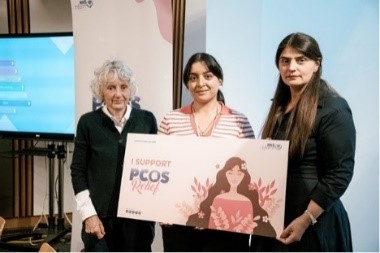
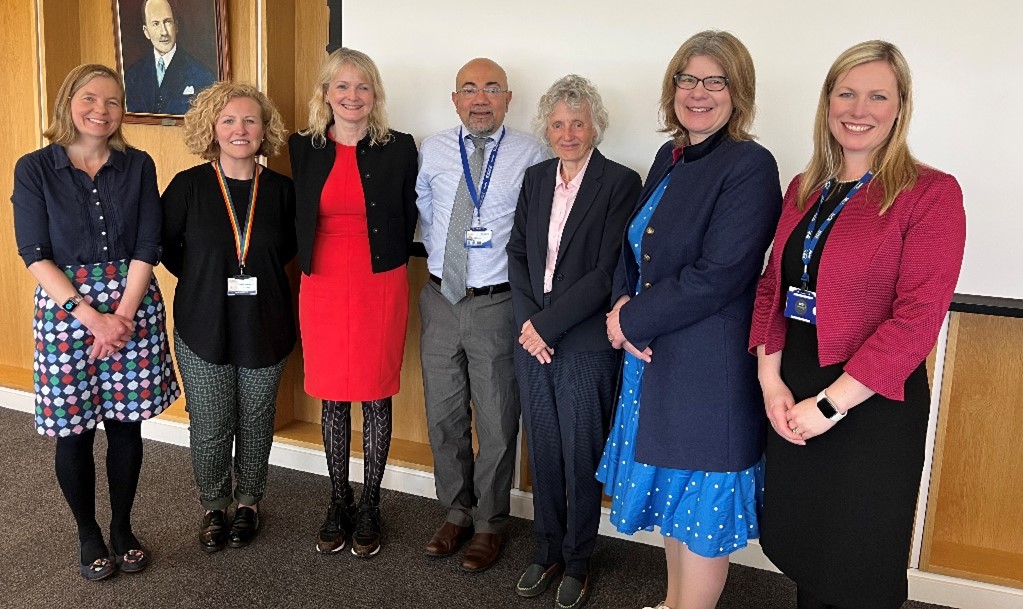
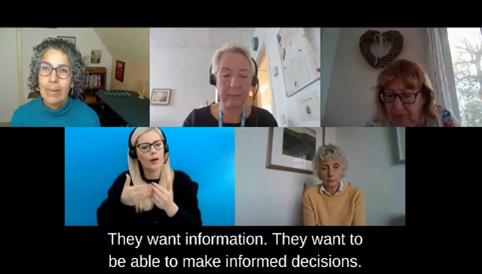
Leave a comment
You must be logged in to post a comment.